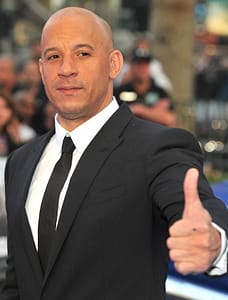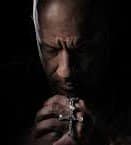
Vin Diesel Hollywood’s Action Titan:-Introduction
Mark Sinclair, better known to the world as Vin Diesel, is one of Hollywood’s most recognizable action stars. Best known for his role as Dominic Toretto in the high-octane Fast & Furious franchise, Diesel has become synonymous with muscle cars, loyalty, and adrenaline-fueled spectacles. Beyond his tough-guy persona on screen, Diesel is also a multifaceted individual—a director, producer, voice artist, screenwriter, and entrepreneur. His rise from humble beginnings to international stardom is a story of perseverance, vision, and relentless passion.
Early Life and Background
Vin Diesel was born Mark Sinclair on July 18, 1967, in Alameda County, California. He has a fraternal twin brother named Paul. Their mother, Delora Sherleen Vincent, was an astrologer and psychologist of English, German, and Scottish descent. Diesel has never met his biological father, and he identifies as a person of color, influenced by the multicultural environment he grew up in. He was raised in New York City by his mother and his adoptive African-American father, Irving H. Vincent, who was an acting instructor and theater manager.
Growing up in the diverse and artistically rich neighborhoods of New York City, Diesel was introduced to acting at an early age. His first encounter with the stage was unplanned. At age seven, he and his friends broke into the Theater for the New City in New York’s Greenwich Village with the intent to vandalize. Instead of calling the police, the theater’s artistic director offered them parts in a play, Dinosaur Door—a decision that would set the course of his life.
Vin Diesel quickly developed a passion for performing arts. He became active in the local theater scene and later studied creative writing at Hunter College in New York, where he began to hone his screenwriting skills. His experiences in theater and writing would become the foundation for his filmmaking ambitions.
The Struggle for Recognition
Despite his talents and determination, Diesel’s early years in Hollywood were marked by struggle and rejection. He faced numerous challenges, including typecasting and the industry’s reluctance to cast an ethnically ambiguous actor in lead roles. Frustrated by the lack of opportunities, Diesel decided to take control of his destiny.
In 1994, he wrote, directed, produced, and starred in a short film called Multi-Facial. The semi-autobiographical film tackled the challenges faced by multiracial actors in Hollywood. Shot in just three days on a budget of $3,000, the film showcased Diesel’s writing and acting skills. Multi-Facial was accepted into the prestigious Cannes Film Festival in 1995, earning critical acclaim and catching the attention of industry insiders.
Following the success of Multi-Facial, Diesel went on to make his feature-length debut with Strays (1997), a gritty urban drama about a drug dealer yearning for a better life. Though it did not perform well commercially, Strays further cemented Diesel’s reputation as a serious filmmaker.
Breakthrough with Hollywood
Diesel’s big break came when iconic director Steven Spielberg saw Multi-Facial and was so impressed that he created a role for Diesel in the World War II epic Saving Private Ryan (1998). Diesel played Private Caparzo, a role that, though brief, made a significant impact. His raw intensity and emotional depth won praise from critics and opened doors to bigger opportunities.
In 2000, Diesel starred as Richard B. Riddick in Pitch Black, a science fiction thriller that became a cult hit. Diesel’s portrayal of the antihero Riddick was widely praised and established him as a compelling leading man. The success of Pitch Black laid the groundwork for a franchise that would include The Chronicles of Riddick (2004) and Riddick (2013), solidifying Diesel’s place in sci-fi lore.
But it was his role as Dominic Toretto in The Fast and the Furious (2001) that catapulted Diesel into superstardom. The film’s mix of street racing, heists, and high-stakes drama resonated with audiences worldwide. Diesel’s brooding presence, deep voice, and the now-iconic mantra of “family” struck a chord that would turn the franchise into one of the most successful in film history.
Establishing a Franchise Empire
Following the first Fast & Furious film, Diesel was poised for mega-stardom. However, he opted out of the second installment (2 Fast 2 Furious, 2003) due to creative differences and a focus on other projects. During this period, he starred in xXx (2002), where he played Xander Cage, an extreme sports athlete turned spy. The film was another box office success, spawning a sequel and establishing a second franchise led by Diesel.
In 2005, Diesel attempted to diversify his roles with the family comedy The Pacifier. Though a departure from his usual action roles, the film performed well commercially, showcasing his versatility and appeal to a broader audience.
Diesel returned to the Fast & Furious series in 2009 with Fast & Furious (the fourth installment). His return reinvigorated the franchise, and from that point on, it evolved into a global juggernaut. With subsequent entries—Fast Five (2011), Fast & Furious 6 (2013), Furious 7 (2015), The Fate of the Furious (2017), F9 (2021), and Fast X (2023)—Diesel became both the face and the soul of the franchise.
Producing, Voice Acting, and Other Ventures
Vin Diesel is not just an actor; he is a prolific producer and entrepreneur. He founded One Race Films, a production company that has produced many of his films, including entries from the Fast & Furious and Riddick franchises. His company is known for promoting diverse talent and producing high-octane, globally appealing content.
Diesel has also made a significant impact as a voice actor. He voiced the lovable robot in the animated classic The Iron Giant (1999), a performance that still resonates with fans. However, his most iconic voice role is undoubtedly Groot, the tree-like creature from Marvel’s Guardians of the Galaxy series. Diesel’s delivery of the phrase “I am Groot” in multiple languages turned a simple line into a cultural phenomenon.
Beyond film, Diesel has also entered the world of video games. He launched Tigon Studios, a game development company that created titles such as The Chronicles of Riddick: Escape from Butcher Bay, which was praised for its gameplay and storytelling.
Personal Life
Vin Diesel is famously private about his personal life. He has been in a long-term relationship with Mexican model Paloma Jiménez since 2007, and the couple has three children together: Hania Riley, Vincent Sinclair, and Pauline, named in honor of Diesel’s late friend and co-star Paul Walker.
Diesel shares a deep bond with his Fast & Furious family, especially Paul Walker. The tragic death of Walker in 2013 during the production of Furious 7 deeply affected Diesel. He often refers to Walker as his “brother” and has paid numerous tributes to him, both personally and professionally. The completion of Furious 7 was emotionally challenging, and the film’s final scenes served as a heartfelt farewell to Walker.
Diesel’s off-screen persona is marked by humility and loyalty. He is active on social media, where he shares moments from his life, motivational messages, and behind-the-scenes glimpses of his projects. Despite his fame, he remains grounded, often crediting his fans and family for his success.
Awards and Legacy
While Diesel has not been a major fixture in traditional awards circuits, he has received various accolades that recognize his contributions to cinema and pop culture. He has won MTV Movie Awards, People’s Choice Awards, and Teen Choice Awards for his action roles. More importantly, he has built a legacy as a blockbuster powerhouse.
Vin Diesel’s influence extends beyond the screen. He has been praised for breaking stereotypes in Hollywood and for his advocacy for diversity in casting and storytelling. His unique background and rise to fame have inspired countless aspiring actors from multicultural backgrounds.
The Fast & Furious franchise alone stands as a testament to his impact. What began as a modest street-racing film evolved into one of the highest-grossing franchises of all time, in large part due to Diesel’s commitment, charisma, and leadership.
Recent Projects and Future Plans
In recent years, Diesel has continued to expand his creative horizons. He returned to the xXx franchise with xXx: Return of Xander Cage (2017) and appeared in the fantasy action film The Last Witch Hunter (2015). In 2020, he starred in Bloodshot, a superhero film based on the Valiant Comics character.
Diesel is also developing new installments in the Riddick series, with Riddick: Furya in development. His production company is exploring television ventures and global partnerships to expand the reach of his stories.
He remains closely involved in the planning of the final chapters of the Fast & Furious saga, with Fast X Part 2 expected to be the franchise’s conclusion. Diesel has hinted at spin-offs and origin stories that could keep the franchise alive in different forms.
Conclusion
Vin Diesel’s journey from a struggling actor to a global superstar is a remarkable tale of ambition, resilience, and creativity. With a career spanning over three decades, he has created some of the most enduring characters in modern cinema. Whether behind the wheel of a muscle car, voicing a tree-like superhero, or producing his own films, Diesel continues to push boundaries and redefine what it means to be a Hollywood leading man.
His story is not just one of fame and fortune—it is one of passion, self-belief, and the unbreakable bond of “family,” both on-screen and off. As Diesel continues to evolve as an artist and entertainer, his legacy is secure as one of the defining figures of 21st-century action cinema.




One thought on “Vin Diesel: The Grit and Glory of Hollywood’s Action Titan.”